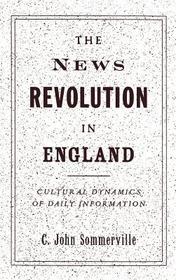
The News Revolution in England
Cultural Dynamics of Daily Information
-
10% KEDVEZMÉNY?
- A kedvezmény csak az 'Értesítés a kedvenc témákról' hírlevelünk címzettjeinek rendeléseire érvényes.
- Kiadói listaár GBP 115.00
-
54 941 Ft (52 325 Ft + 5% áfa)
Az ár azért becsült, mert a rendelés pillanatában nem lehet pontosan tudni, hogy a beérkezéskor milyen lesz a forint árfolyama az adott termék eredeti devizájához képest. Ha a forint romlana, kissé többet, ha javulna, kissé kevesebbet kell majd fizetnie.
- Kedvezmény(ek) 10% (cc. 5 494 Ft off)
- Kedvezményes ár 49 447 Ft (47 093 Ft + 5% áfa)
Iratkozzon fel most és részesüljön kedvezőbb árainkból!
Feliratkozom
54 941 Ft

Beszerezhetőség
Megrendelésre a kiadó utánnyomja a könyvet. Rendelhető, de a szokásosnál kicsit lassabban érkezik meg.
Why don't you give exact delivery time?
A beszerzés időigényét az eddigi tapasztalatokra alapozva adjuk meg. Azért becsült, mert a terméket külföldről hozzuk be, így a kiadó kiszolgálásának pillanatnyi gyorsaságától is függ. A megadottnál gyorsabb és lassabb szállítás is elképzelhető, de mindent megteszünk, hogy Ön a lehető leghamarabb jusson hozzá a termékhez.
A termék adatai:
- Kiadó OUP USA
- Megjelenés dátuma 1997. január 16.
- ISBN 9780195106671
- Kötéstípus Keménykötés
- Terjedelem208 oldal
- Méret 243x167x22 mm
- Súly 517 g
- Nyelv angol 0
Kategóriák
Rövid leírás:
This is the first book to analyse the essential feature of periodical media, which is their periodicity. Having to sell the next issue as well as the present one alters the relation between authors and readers--or customers--and subtly shapes the way that everything is reported. The story of the first century of periodical production in England shows how soon the public acquired a news consciousness which was at odds with the "print consciousness" which Marshal McLuhan described.
TöbbHosszú leírás:
This is the first book to analyse the essential feature of periodical media, which is their periodicity. Having to sell the next issue as well as the present one changes the relation between authors and readers--or customers--and subtly shapes the way that everything is reported, whether politics, the arts and science, or social issues. So there are certain biases that are implicit in the dynamics of news production or commodified information, quite apart from the intentions of journalists.
The story of the first century of periodical media in England shows how soon publishers mastered this entirely new treatment of knowledge. And it shows how soon the public despite certain misgivings, adopted a news consciousness that was at odds with the "print consciousness" which Marshall McLuhan described. The colorful pioneers of journalism history seem different when seen first as entrepreneurs, creating a market for the most ordinary sort of information, rather than as heroes of enlightenment and liberty.
Looking closely at the publications themselves rather than recounting the struggles of journalists reveals more of what readers were actually faced with. It also suggests how periodicity would begin to shape their minds. Further, it indicates how the very immaturity of the early media allowed them to perform their function of initiating discussion, and how soon a commercial maturity undermined that function, leading to deficiencies which are now widely lamented but little understood.
A valuable and stimulating account of a crucial cultural change driven by periodicity.




